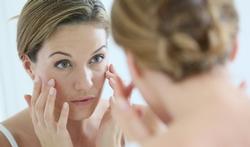80 percent of the population between the ages of 11 and 30 suffer from pimples. So it is a common problem that can seriously undermine someone's self-confidence. To prevent unsightly scars, it is better to prevent pimples. The right routines can help with that.
Tips against pimples
Dermatologists suggest the following guidelines for acne skin:
- Cleanse your face every day. It is especially important in the evening to remove dirt and make-up from your face. A daily facial cleanser is crucial to keep your pores clear and to prevent inflammation of your skin.
- It is better not to squeeze pimples, because that can leave you with scars. In addition, the dirt in your nails can cause a new inflammation, which will cause a pimple to appear. Dermatologist Thomas Maselis says: "If you manipulate a sebaceous gland, it produces more sebum and you damage the exit, with all the consequences that entails."
- Use a moisturizing cream. Oily skins also need hydration. It is not because a skin is too rich in oil that it is also sufficiently hydrated. If you nourish the skin well, it has to produce less sebum itself to compensate for certain nutrients. This way you reduce the chance of pimples. Note: use a non-comedogenic cream to prevent blackheads. Non-comodogenic means that a product does not contain pore-clogging ingredients. “A common misconception is that greasy creams are good for your skin,” says Maselis. "But they can make your epidermis swell, making the exit of the sebaceous glands thicker and narrower and making it more difficult for sebum to escape."
- Exfoliate your skin once a week. This removes dead skin cells from the surface of the skin. You will also have less black dots. However, you should not exfoliate too often to avoid irritating your skin.
- To remove a pimple, you can use a cream or gel with benzoyl peroxide locally. This product kills the bacteria that cause pimples and inhibits the production of excess sebum. The swelling and redness of pimples will also decrease.
- Wear the right makeup. If you have acne-prone skin, you can still wear make-up, but it is important that you choose oil-free products. They give coverage to your face without clogging your pores. Mineral makeup is a good option.
- Eat healthy and drink plenty of water. A healthy and varied diet is necessary to provide your skin with sufficient nutrients. With a lack of nutrients, she will produce sebum, which can cause pimples and black dots. Drinking enough water – about two liters a day – is necessary to remove waste products such as sebum from your skin. This keeps your pores clean and prevents pimples from developing.
- Get enough sleep. A good night's sleep is important for healthy skin. The skin mainly recovers at night.
- If you have very severe acne, you may need to see a professional. A dermatologist can suggest a tailor-made treatment, such as a birth control pill , antibiotic treatment , chemical peel or laser treatment.




